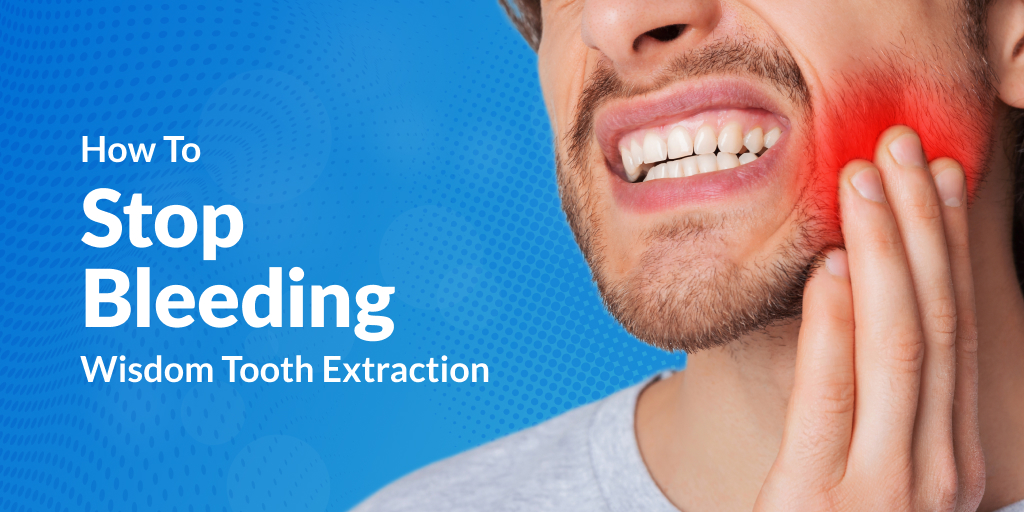
After having a wisdom tooth removed, some bleeding is expected, but managing it effectively is important for both comfort and proper healing. This blog post discusses several trusted techniques for how to stop bleeding after wisdom tooth extraction, ensuring you can handle this common post-operative issue smoothly.
Immediately following your wisdom tooth extraction, your dentist will place a gauze pad over the extraction site. It’s important to keep this gauze in place for at least 30 to 45 minutes after leaving the dental office. Bite down firmly but gently on the gauze to apply pressure, which helps form a blood clot in the socket. This initial step is crucial as it sets the foundation for healing.
After removing the gauze, if bleeding continues, applying a cold compress to the cheek adjacent to the extraction site can help. The cold helps constrict blood vessels, which slows the bleeding. Do not apply ice directly to your skin; instead, wrap it in a cloth and hold it in place for 15-minute intervals during the first 24 hours after extraction.
If bleeding persists beyond the initial use of gauze, you may need to replace it with fresh gauze. To do this effectively, fold a clean piece into a pad thick enough to bite on. Dampen it with clean water and place it directly on the extraction site. Continue to apply pressure by biting down gently for another 30 minutes. Repeat this process as necessary, always using clean gauze to prevent infection.
When resting, make sure to prop your head up with pillows. Keeping your head elevated above your heart reduces the blood pressure in the area of the extraction, which can help reduce bleeding. Avoid lying flat as this can prolong bleeding.
For the first 24 hours after your wisdom tooth extraction, it’s important to avoid activities that can exacerbate bleeding. This includes strenuous exercise, smoking, and using straws. The suction motion of using a straw can dislodge the blood clot that’s forming in your socket, and physical exercise can increase blood pressure and lead to further bleeding.
Stick to a soft or liquid diet for the first few days after your extraction. Hot beverages and food should be avoided as they can dissolve the clot that is forming, leading to increased bleeding. Foods like soups should be consumed lukewarm. Additionally, chew on the side opposite the extraction site to avoid any additional pressure on the area.
Post-extraction, maintaining oral hygiene is crucial but can be tricky. Start by gently rinsing your mouth with warm salt water 24 hours after the surgery. Mix one teaspoon of salt in a cup of warm water and gently swish it around your mouth for 30 seconds before spitting it out. This not only helps to cleanse the mouth but also reduces swelling and soothes sore tissues. Avoid vigorous rinsing or spitting to prevent dislodging the blood clot.
Pain management is a key aspect of recovery. Over-the-counter pain relievers such as acetaminophen or ibuprofen can be effective. Follow your dentist’s instructions regarding dosage and frequency to manage discomfort. In some cases, your dentist may prescribe stronger pain medication. It’s important to use these medications as directed to avoid any potential side effects.
Some patients find relief using natural remedies. Herbal teas like chamomile are known for their anti-inflammatory properties and can provide a calming effect. Applying a tea bag soaked in cold water to the extraction site can also aid in forming a clot and decrease bleeding. However, always consult with your dentist before using herbal remedies to ensure they won’t interfere with your recovery process.
While following these steps should minimize bleeding and promote healing, be aware of signs that indicate complications. Symptoms like intense pain that doesn’t subside, visible signs of infection (increased redness, swelling, or pus), or bleeding that remains heavy after 24 hours should prompt an immediate call to your dentist. Recognizing these signs early can prevent serious complications and ensure a smoother recovery.
Your dentist will likely schedule a follow-up appointment to monitor the healing process and ensure that the extraction site is healing properly. Keep these appointments even if you feel fine, as they are essential for preventing complications. During these visits, your dentist can also adjust any part of your aftercare regimen if needed and answer any questions you may have about your recovery.
Persistent or excessive bleeding following wisdom tooth extraction warrants immediate attention from a dental professional. If bleeding persists beyond 24 hours or becomes heavy, contacting your dentist is crucial. Such bleeding could indicate complications such as infection or a dislodged blood clot, a condition known as a dry socket, which requires prompt treatment to prevent further issues.
Seeking professional help ensures that the underlying cause of the bleeding is addressed effectively. Your dentist may need to provide additional treatment, such as applying specialized dressings or prescribing antibiotics, to manage the situation. Moreover, they may offer guidance on adjusting post-operative care to promote proper healing and prevent future complications. Timely intervention can mitigate risks and facilitate a smoother recovery process.
For comprehensive information on wisdom tooth extractions and post-operative care, consulting a trusted dental resource or scheduling an appointment with a dentist, such as those at Wisdom Teeth Removal in Los Angeles, is advisable.
Once your extraction site has healed, it might be a good time to consider other dental treatments that can improve the appearance and functionality of your teeth. For those looking into cosmetic options, All-inclusive Veneers in Los Angeles might be an ideal solution to enhance your smile.
If you’re experiencing any issues after your wisdom tooth extraction or are interested in exploring other dental treatments, don’t hesitate to reach out to us at LA Dental Clinic. We are here to ensure that your recovery is as smooth and comfortable as possible. Contact us today to schedule a follow-up or consultation. At LA Dental Clinic, we’re committed to providing you with the best care and helping you maintain optimal oral health.

LA Dental Clinic
3377 Wilshire Blvd #202
Los Angeles, CA, 90010